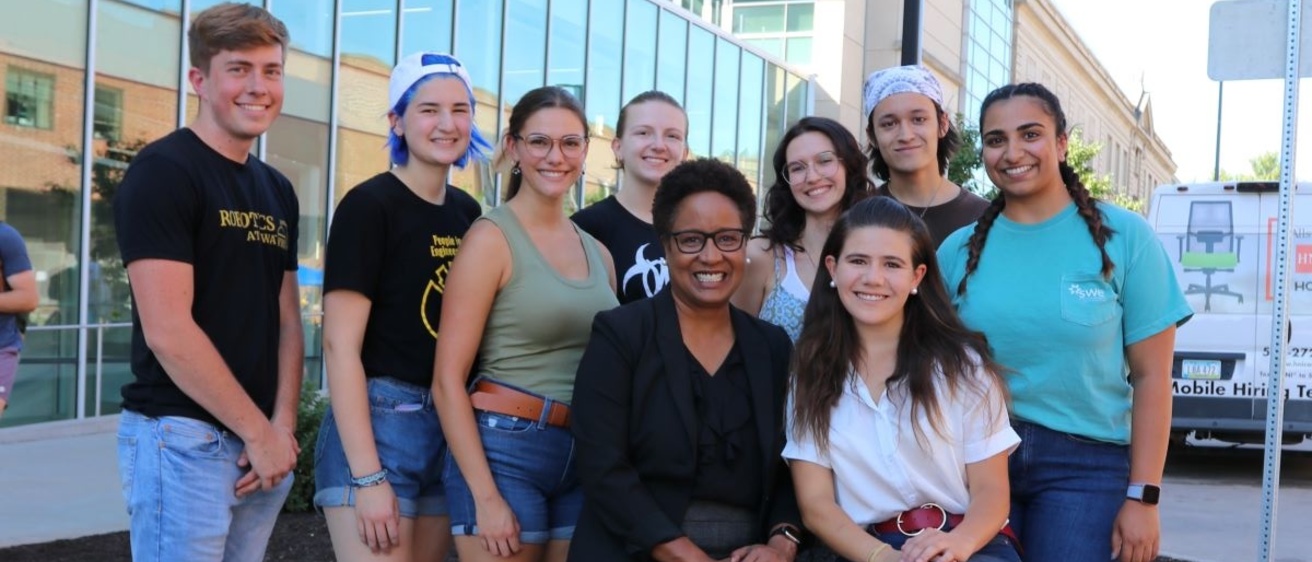“Dean Nembhard navigated the college through challenging times, starting with the global pandemic and ongoing shifts in higher education due to demographic and other national trends. The Dean’s Office during her tenure was a hub of activity, and all of us are grateful to her for her caring, calm, and expert leadership, leading to dynamic changes and strategic initiatives that will have a lasting impact on the college.”
— H.S. Udaykumar, Associate Dean for Graduate Programs, Research and Faculty

In her time as dean of the College of Engineering, Harriet Nembhard focused on raising visibility of the college’s research strengths, supporting undergraduate and graduate student success, and building community throughout the college while also expanding partnerships across campus.
“What brought me to Iowa remains true today – this is a small college of distinction with a close-knit community of innovative and committed faculty and staff, enterprising students, supported by dedicated and accomplished alumni,” said Nembhard. “Whether we are working to mitigate floods, protect data, improve health care, or advance new automated technologies, the work that we do has a direct impact on the lives and livelihoods of Iowans and people across the country and around the world. Our students leave here as ethical and globally aware engineers who understand that engineering innovation has a societal impact and that we must consider the equitable distribution of technology and information in all aspects of the engineering process.”
Nembhard took a keen interest in enhancing the undergraduate and graduate education experience in the College of Engineering through curricular and cocurricular offerings. She spearheaded establishing the Leadership, Ethics, and Professional Pathways (LEaPP) Academy, which is designed to broaden student experiences through engagement with successful alumni, programming focused on the societal impact of engineering, and fostering a culture of leadership among engineering students. She also sought new directions for both the Hanson Center for Communication and the Virginia A. Myers NEXUS of Engineering and the Arts. Taken together, these initiatives provide the college’s bright, engaged, and energetic students with a rich set of opportunities for enrichment and growth across the entire span of their academic career. Additionally, master’s and doctoral programs have benefited from new courses and certificates on artificial intelligence, modeling and simulation, autonomous systems, and advanced manufacturing.
During her tenure, several other strides were made, including junior faculty development initiatives leading to several CAREER Awards from the National Science Foundation (NSF), large grant initiatives leading to NSF Established Program to Stimulate Competitive Research (EPSCoR) Track-II grants with Iowa State University, the creation of the new Center for Hydrologic Development, and the transition from the National Advanced Driving Simulation center to the Driving Safety Research Institute. Nembhard was also committed to supporting staff and was instrumental in the creation of a collegiate tuition assistance program and in setting aside a pool of funds for staff professional development activities.
One goal of the college’s Strategic Plan, revisited and completed after Nembhard joined the college, is to expand the number of faculty members by 20 over the next five years. To date, the college has hired 11 new faculty members, including a new department chair, whose research and scholarship will build on the college’s strengths in engineering for human health, engineering for the environment, and engineering for emerging technologies.
Of course, having joined the college in summer 2020, Nembhard faced some unexpected challenges brought on by the upheaval of higher education during the COVID-19 pandemic. Despite not being able to interact with colleagues and students in face-to-face settings, Nembhard noted that the pandemic taught her several leadership lessons.

“Among the many lessons we learned during COVID-19 a central theme emerged: agility,” said Nembhard. “We needed to establish channels for crisis communication to inform students, parents, and the entire college community of the evolving situation and plans moving forward. We needed to keep students engaged and support their physical and mental wellbeing by checking in with them and providing them with systems in areas such as academic advising, counseling, and career services. We needed to change delivery of courses and labs by using new digital platforms and asynchronous learning.”
Emerging from the pandemic, Nembhard worked diligently to foster a renewed sense of community in the college, returning to in-person awards and recognition ceremonies, distinguished lectures, and alumni events as well as establishing new gatherings such as the fall block party where students could engage with student organizations, employers, and departments at the festive event outside of the Seamans Center.
Recognized for her leadership and commitment to advancing STEM education, Nembhard was recruited to become the next president of Harvey Mudd College in Claremont, California , a role she began on July 1, 2023. At Harvey Mudd, Nembhard will continue her national leadership focusing on the significant changes in higher education, notably the need to produce STEM graduates who can meet the needs of humanity and society.
“Students who graduate with STEM degrees are uniquely positioned to protect lives and livelihoods while also improving quality of life for people everywhere,” said Nembhard. “I have seen firsthand the kinds of ground-breaking work produced by our students who have been mentored by faculty and staff whose transformative research defines the impact that STEM education can have on society.”
